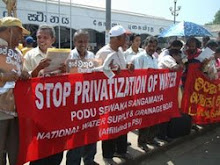-Should water be a free human right or a commodity?
-If a commodity, is there a line on what can be sold and by and to whom?
-Does this depend on the place (i.e. developed vs. developing)?
-What is the effect of the level of corruption or loyalty of the government to its people?
-Where does this “need to be modernized” arise and what is its validity?
Essentially the basis for judgment of these issues exists within this moral frame, and has no final authority for what is right and what is wrong, yet a decision must be reached and a course of action taken, making this a very difficult conflict to resolve.

The people of Asuncion have been active participants in this conflict, and their position on fairness in this issue, is that privatizing water denies them of their basic human rights, and ability to sustain themselves. As with many water privatization conflicts, the people are aware of the effects of being denied their free right to water, mostly because they suffer from poor accessibility already.
“In country after country in recent years, the World Bank has been quietly imposing a for-profit system of water delivery, leaving millions of people without access to water.”
Those in support of privatization in Asuncion feel that they are being fair by increasing accessibility to water and sanitation—for a price. The IMF and World Bank feel that they are being fair by denying the funds they have been providing because it encourages the acceptance of privatization.
Everyone involved in the conflict feels that they are being fair.
And everyone feels that a sacrifice made by the other side will be justified.
“Fairness is rarely as simple as distributing a common good in equal measures.”
-N

No comments:
Post a Comment